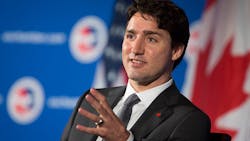Imperial Oil, BP in Limbo After Canada Freezes Arctic Drilling
Energy firms including Imperial Oil Ltd. (IW 1000/202) and BP Plc (IW 1000/9) will get a year of consultations to hash out the fate of their rights in Canada’s Arctic after Prime Minister Justin Trudeau’s drilling freeze set the stage for a dispute over license extensions.
The Canadian leader and U.S. President Barack Obama said this week they would designate most of North American Arctic waters off-limits to new activity, including all future oil and gas licensing in Canadian waters. Trudeau’s government said existing licenses wouldn’t be affected, but initially offered scant detail.
Five companies -- Imperial, BP, ConocoPhillips, Chevron Corp. and Franklin Petroleum Canada Ltd. -- hold active exploration licenses in Canada’s share of the Beaufort Sea, where there currently isn’t any oil production. Many of those licenses expire within the next five years, when Trudeau has pledged to review his moratorium.
Companies remain eligible to upgrade their existing licenses, and some may seek extensions, which will be a central issue in talks between government and the industry over the next year.
“It’s their intention to have discussions with each of the active license holders,” said Paul Barnes, Atlantic Canada and Arctic manager for the Canadian Association of Petroleum Producers, the main oil-industry lobby group. “I suspect most companies would still want to maintain an active license there” or seek an extension “until such time as the government has another review.”
The exploration licenses due to expire over the next five years were issued in 2012 when crude hovered around $100 a barrel, nearly double its current price. “Companies have been walking away from their leases in the North American market, or seeking extensions of those leases because they can’t justify any expenditure on those leases at current pricing,” said Michael Byers, a University of British Columbia professor who studies Arctic issues.
All five companies have exploration licenses in the Beaufort Sea that expire between 2019 and 2023. Of those, only closely held Franklin has permits that extend past the five-year window. Barnes said exploration has been quiet of late, with no drilling since 2012.
All but Franklin also hold additional permits known as significant discovery licenses in the Beaufort issued as far back as the 1980s. Those types of permits, which don’t expire and are a precursor to production licenses, are also held across northern Canada by Suncor Energy Inc., Paramount Resources Ltd., Devon Energy Corp., Nytis Exploration Company Canada Ltd. and others, government records show. There are no current offshore production licenses in Canada’s Arctic waters.
In its joint statement this week, Trudeau’s government ruled out “future offshore Arctic oil and gas licensing” and later said existing permits won’t be affected. It didn’t specify what happens next for license holders.
Canada's Next Steps
“Current licenses are not impacted,” said Sabrina Williams, a spokeswoman for Indigenous and Northern Affairs Minister Carolyn Bennett, Trudeau’s lead minister for Arctic development. Williams said the government “will determine next steps after consultation with industry and other interested stakeholders.”
The consultations will be conducted over one year by Bennett and Natural Resources Minister Jim Carr. In the meantime, companies with exploration licenses can still “accede to Significant Discovery within their existing permit timelines,” Williams said, meaning offshore oil development can still potentially continue in the Arctic after the Trudeau and Obama announcement.
The terms of Obama’s ban, which applies to most of the U.S. share of the Beaufort Sea, is also unclear as he prepares to leave office. The path for a legal challenge from the incoming administration of President-elect Donald Trump is murky.
Northwest Territories Premier Bob McLeod has objected to his northern region, the shores of which are nearest to much of the existing licensed exploration areas, being shut out of talks that led to the Arctic offshore freeze. He said he expects companies that already hold permits will be rejected if they apply for extensions.
“I’d be very surprised if they’re not turned back,” McLeod said in an interview Tuesday, shortly after he spoke with Trudeau about the new measures. “If oil and gas is shut down, then we need to look at diversifying our economies. And we need to have sustainable development in the North.”
Imperial has previously called for extending the terms of exploration licenses “to ensure future oil and gas activities are conducted in an appropriately paced, safe and environmentally responsible manner,” spokeswoman Killeen Kelly said in a statement this week, acknowledging uncertainty around the measures so far. “With respect to existing licenses we will work to understand the implications to our business, if any.”
Chevron referred questions to CAPP, the lobby group. ConocoPhillips declined to comment; BP and Franklin didn’t immediately respond to queries.
Some existing license holders may seek extensions, Barnes said, but Arctic offshore development has always been a long-term proposition. “They aren’t short-term. They are potentially medium-term but likely longer-term,” CAPP President Tim McMillan said. “Each ecosystem is unique and needs to be looked at specifically.”
By Josh Wingrove and Robert Tuttle
About the Author
Bloomberg
Licensed content from Bloomberg, copyright 2016.
